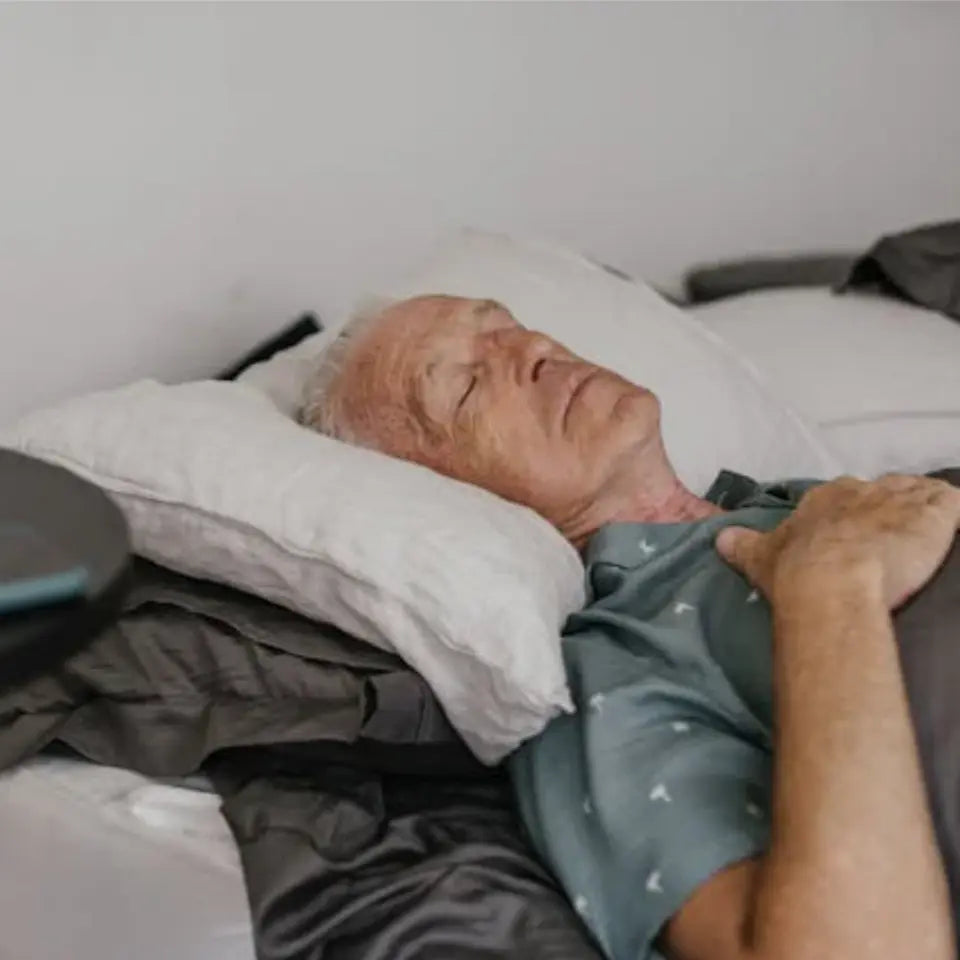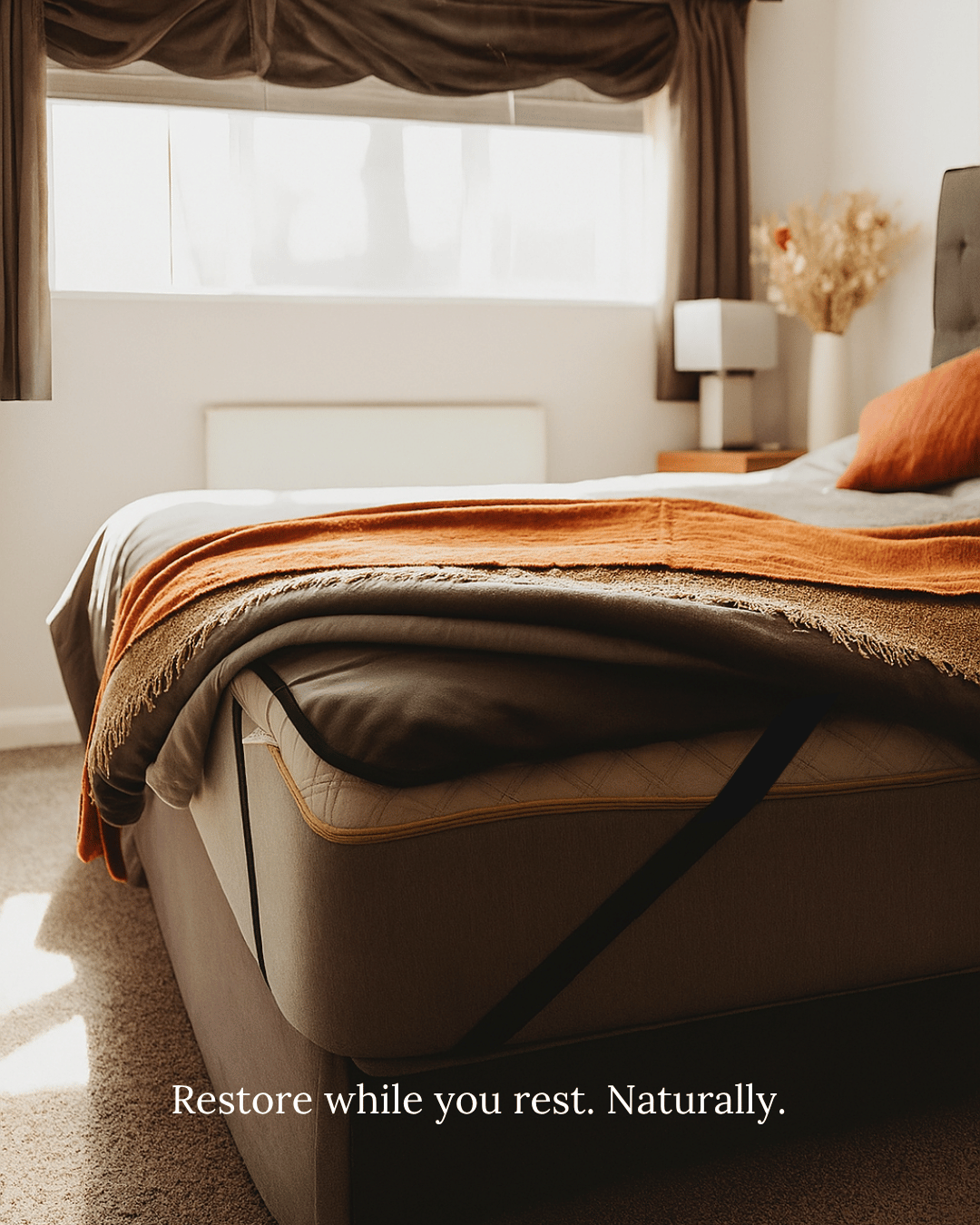Una lucha familiar
Son las 2:00 a. m. Ya has dado la vuelta a la almohada dos veces, has cambiado de lado, y aun así, tu mente zumba más fuerte que el cortacésped del vecino. Quizás hayas probado la melatonina. Quizás hayas comprado un colchón que costó más que un coche usado. Aun así, sigues despertando aturdido, rígido y preguntándote lo mismo: ¿por qué ya no puedo dormir bien?
Aquí hay una posibilidad que quizá no hayas considerado: quizá no sea tu colchón, tu almohada ni siquiera tu té antes de dormir. Quizás la clave sea que tu cuerpo se ha desconectado de algo esencial: el contacto directo con el campo eléctrico de la Tierra. Ahí es donde entra en juego la conexión a tierra durante el sueño.
El problema del sueño hoy
Los problemas de sueño son tan comunes que casi se han vuelto normales. Los estudios demuestran que casi la mitad de los adultos mayores de 40 años reportan mala calidad de sueño , y entre los mayores de 60, los síntomas de insomnio afectan hasta a 1 de cada 3. Incluso cuando las personas técnicamente duermen de 7 a 8 horas, a menudo se despiertan sin energía, con confusión mental, dolores o falta de energía que los aqueja durante el día.
La verdad es que dormir mejor no se trata solo de cuánto tiempo pasas en la cama, sino de lo que hace tu cuerpo durante esas horas. Y la vida moderna, con su luz azul, campos electromagnéticos y estrés constante, ha alterado los ritmos que antes hacían que el descanso fuera reparador.
¿Qué es la conexión a tierra durante el sueño?
Conectarse a tierra (también llamado toma de tierra) significa hacer contacto físico directo con la carga eléctrica natural de la Tierra. En la naturaleza, esto ocurre al caminar descalzo sobre la hierba o la arena. Pero de noche, esto no es precisamente práctico.
Por eso existen los protectores de colchón con conexión a tierra. Están diseñados con fibras de carbono conductoras que se conectan a la toma de tierra de tu casa. Coloca uno debajo de tu sábana ajustable y transfiere los electrones libres de la Tierra a tu cuerpo mientras duermes . En otras palabras: puedes estar conectado a tierra toda la noche, sin moverte de la cama.
La ciencia sobre la calidad del sueño
¿Qué dice realmente la investigación? Hablemos de la investigación sobre la calidad del sueño.
-
Los primeros trabajos del Dr. James Oschman y sus colegas demostraron que la conexión a tierra regula el cortisol, la hormona del estrés que define el ciclo sueño-vigilia. En los participantes conectados a tierra, los ritmos de cortisol adoptaron un patrón más natural: más altos por la mañana (para dar energía) y más bajos por la noche (para descansar). Este hallazgo, basado en la ciencia de la conexión a tierra, sobre el ritmo del cortisol es fundamental para que muchos reporten un sueño más profundo.
-
Un ensayo aleatorizado doble ciego en Corea (2025) fue aún más lejos: 60 participantes usaron tapetes de conexión a tierra reales o tapetes placebo idénticos durante 31 días. El grupo conectado a tierra durmió más tiempo (medido objetivamente mediante rastreadores), mientras que ambos grupos reportaron mejoras subjetivas. Esto es significativo: fue uno de los primeros ensayos rigurosos que demostró que los beneficios de la conexión a tierra durante el sueño no son solo placebo.
-
Otros estudios realizados por investigadores como Gaétan Chevalier encontraron una reducción del estrés nocturno, una actividad de ondas cerebrales más tranquila y mejoras mensurables en la calidad del sueño.
Entonces, ¿conectarse a tierra mejora el insomnio? La ciencia emergente dice que sí, especialmente cuando se practica de forma constante por la noche.
Experiencias del mundo real
La investigación es convincente, pero a veces lo que más impacta es una historia.
-
Pensaba que simplemente dormía mal. Me despertaba cinco veces por noche. Después de un mes durmiendo en tierra, todavía me despierto de vez en cuando, pero normalmente solo una vez, y me vuelvo a dormir enseguida. Hacía años que no me sentía tan descansado.
-
Solía despertarme con las articulaciones rígidas todas las mañanas. Dos semanas después de empezar con la conexión a tierra, noté que me estiraba en la cama en lugar de ir cojeando hasta la cafetera.
-
Probé todos los suplementos posibles. ¿Qué me ayudó finalmente? Ponerme un cubrecolchón y dejar que mi cuerpo se reconectara durante la noche.
Estas no son anécdotas aisladas, sino que se hacen eco de las preguntas de miles de personas en Internet sobre si vale la pena usar protectores de colchón con conexión a tierra para descansar mejor.
Cómo empezar a conectar a tierra por la noche
Buenas noticias: es increíblemente sencillo.
-
Elige un cubrecolchón con conexión a tierra. Colócalo debajo de la sábana bajera.
-
Conéctelo a una toma de corriente con conexión a tierra. Use un comprobador sencillo para confirmar la conductividad.
-
Duerme como siempre. No necesitas hacer nada más.
Solución de problemas:
-
Si no nota resultados inmediatos, no se asuste. Algunas personas notan cambios la primera semana; otras, especialmente con inflamación prolongada, pueden tardar un mes o más.
-
Asegúrese de que su toma de corriente esté correctamente conectada a tierra (la mayoría de los problemas de “no funciona” son en realidad problemas de cableado).
-
La constancia es clave: piensa en ello como si fuera ejercicio o una rutina de sueño.
Beneficios potenciales más allá del sueño
Aunque los titulares se centran en el sueño, los beneficios del grounding van más allá. Las investigaciones sugieren:
-
Menos rigidez y dolor al reducir la inflamación nocturna.
-
Mañanas más tranquilas, energía más estable gracias a los ritmos equilibrados de cortisol.
-
Mejor estado de ánimo y claridad mental , porque despertarse descansado cambia cómo te sientes durante todo el día.
Conclusión – Dormir con los pies en la tierra
Entonces, ¿puede la conexión a tierra por la noche mejorar la calidad del sueño? La respuesta está respaldada por la ciencia y se refleja en innumerables historias: sí, la conexión a tierra constante puede ayudar a que tu cuerpo finalmente se relaje como fue diseñado.
En lugar de otro colchón costoso u otro experimento con suplementos, la conexión a tierra ofrece algo más simple: una conexión natural que su cuerpo ha estado perdiendo .
¿Estás listo para ver lo que un mes de sueño reparador puede lograr?
👉 Explora el colchón de conexión a tierra de Earthbound y comienza a despertarte renovado, sin dolor y verdaderamente descansado.
















